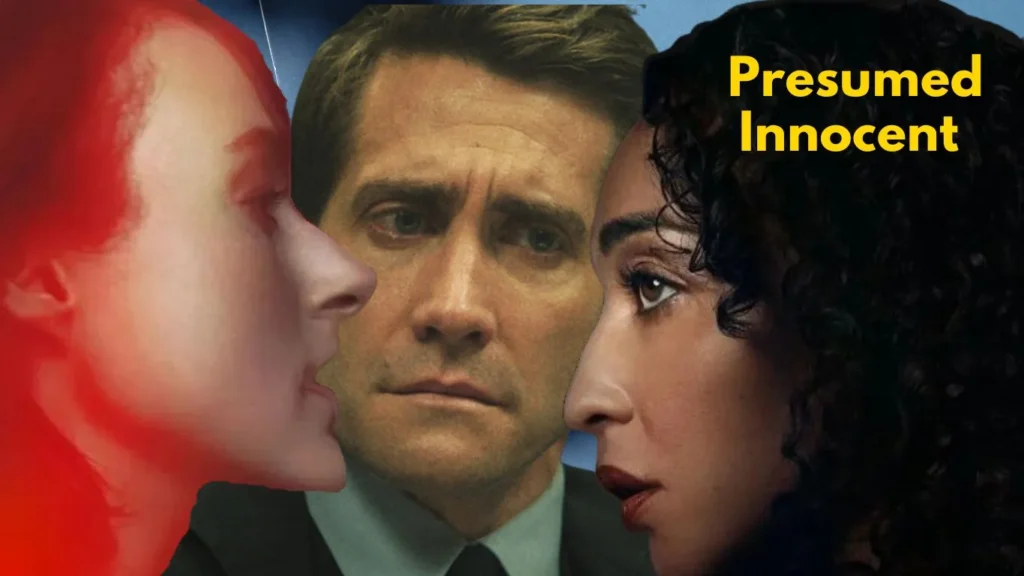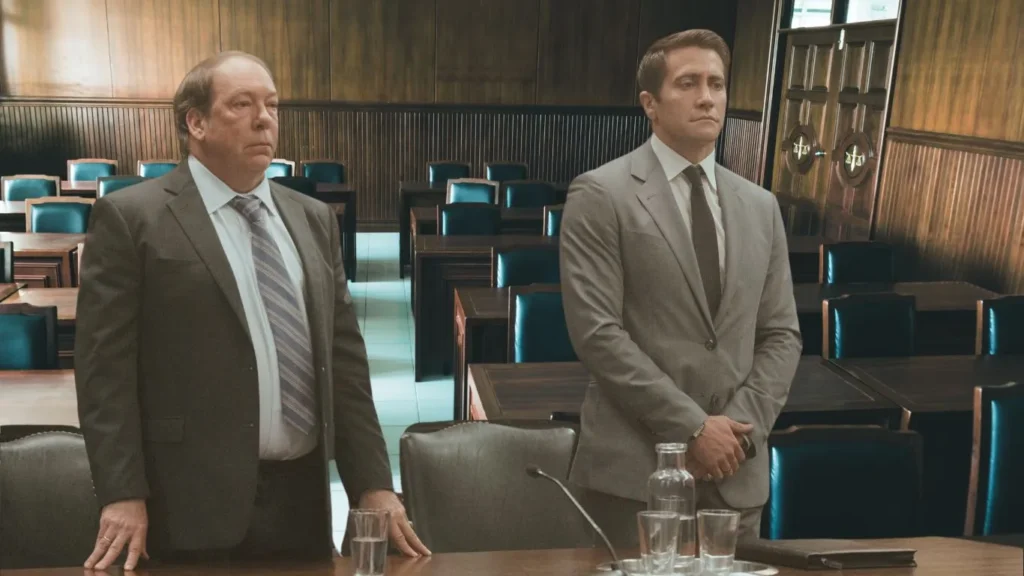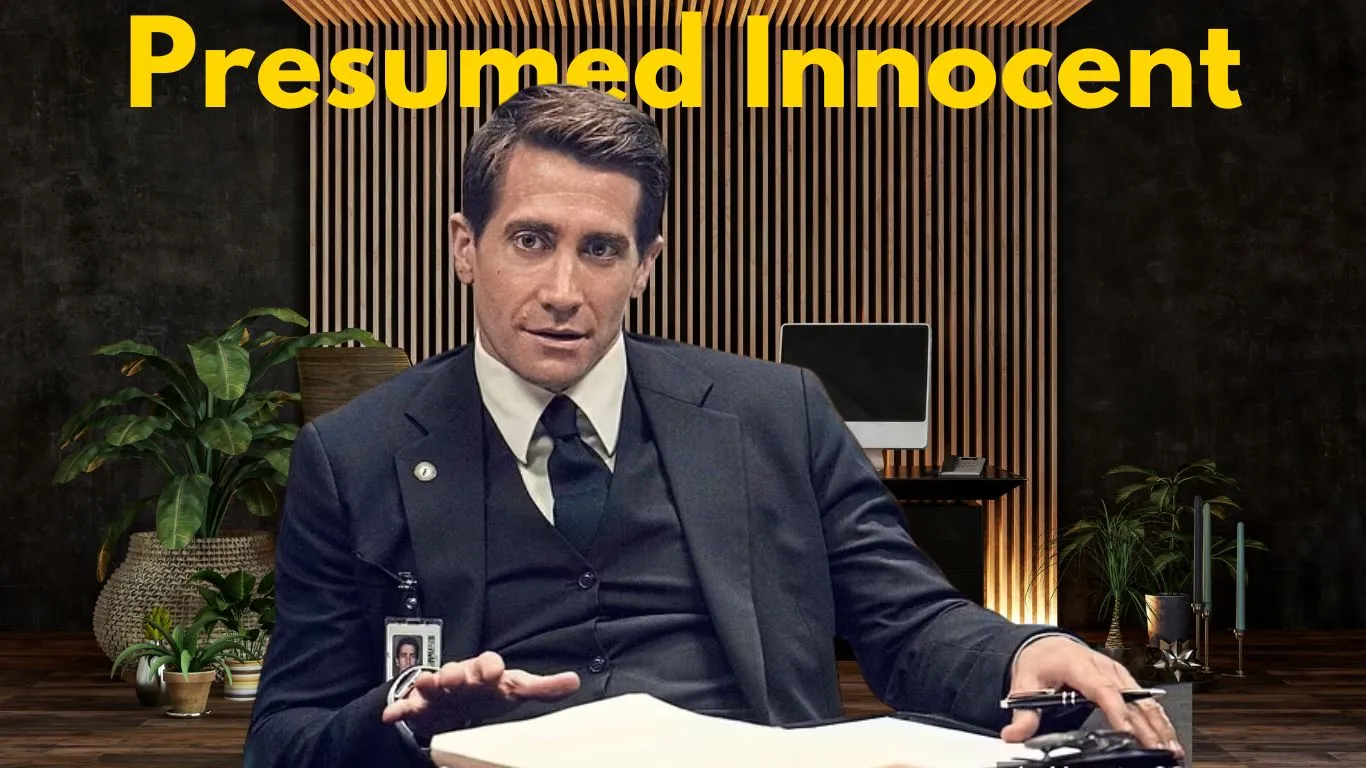Presumed Innocent
GuessingThe world of legal dramas has been set ablaze by the arrival of “Presumed Innocent,” a riveting series that has captured the attention of viewers and critics alike. This eight-episode limited series, which premiered on Apple TV+ in June 2024, has quickly become a cultural phenomenon, drawing audiences into its intricate web of suspense, betrayal, and moral ambiguity.
At its core, “Presumed Innocent” tells the story of Rusty Sabich, a seasoned prosecutor whose life is turned upside down when he becomes the prime suspect in the brutal murder of a close colleague. As the investigation unfolds, viewers are taken on a rollercoaster ride of twists and turns, forcing them to question their assumptions and grapple with the complexities of the human psyche.
What sets “Presumed Innocent” apart from other legal dramas is its nuanced exploration of the ripple effects that a high-profile murder case can have on the lives of those involved. The series delves deep into the personal and professional ramifications of the accusation, examining how it strains relationships, tests loyalties, and pushes individuals to their breaking points.
With its star-studded cast, led by the incomparable Jake Gyllenhaal, and a creative team helmed by industry veterans David E. Kelley and J.J. Abrams, “Presumed Innocent” has set a new standard for prestige television. Its success has garnered critical acclaim and paved the way for a second season, promising to keep audiences on their seats for years.
In this comprehensive exploration of “Presumed Innocent,” we’ll delve into the show’s origins, its compelling characters, the intricate plot that keeps viewers guessing, and the broader implications it raises about the nature of justice and the human condition. Join us as we unravel the mysteries and complexities of this groundbreaking series that has taken the television landscape by storm.
The Genesis of a Modern Classic
The journey of “Presumed Innocent” from page to screen is a testament to the enduring power of great storytelling. Originally penned by Scott Turow in 1987, the novel that inspired the series quickly became a literary sensation, captivating readers with its intricate plot and morally complex characters.
From Novel to Silver Screen
The book’s success naturally led to a 1990 film adaptation starring Harrison Ford as Rusty Sabich. This big-screen version, while well-received, only scratched the surface of Turow’s rich narrative tapestry. It left many fans craving a more in-depth exploration of the story’s nuances and character development.
A New Vision for Television
Enter David E. Kelley, a television titan known for his ability to craft compelling legal dramas. Recognizing the potential for a more expansive adaptation, Kelley set out to bring “Presumed Innocent” to the small screen in a way that would do justice to its source material while also appealing to modern audiences.
Assembling a Dream Team
To bring this vision to life, Kelley partnered with J.J. Abrams, whose production company Bad Robot has been behind some of the most innovative and successful television series in the past two decades. Together, they assembled a team of writers, directors, and actors who could breathe new life into Turow’s characters and themes.
A Contemporary Reimagining
While staying true to the core elements of the original story, the television adaptation of “Presumed Innocent” updates the setting and themes for a 21st-century audience. The series tackles contemporary issues within the legal system, explores the impact of media scrutiny on high-profile cases, and delves into the psychological toll of being accused of a heinous crime in the age of social media.
The Power of Long-Form Storytelling
The decision to adapt “Presumed Innocent” as a limited series rather than a feature film allowed the creative team to explore the story’s complexity fully. With eight hour-long episodes, the show has the luxury of time to develop its characters, build tension, and explore the various subplots that make the narrative so rich and compelling.
This expanded format also enables the series to delve deeper into the personal lives of its characters, showing how the central murder case affects not just Rusty Sabich but his family, colleagues, and the broader community. This attention to detail and character development sets “Presumed Innocent” apart from other legal dramas on television.
A Star-Studded Ensemble Cast
One of the key factors contributing to the success of “Presumed Innocent” is its exceptional cast. Led by Jake Gyllenhaal in a career-defining performance, the ensemble brings depth, nuance, and authenticity to their roles, elevating the material to new heights.
Jake Gyllenhaal as Rusty Sabich
Jake Gyllenhaal’s portrayal of Rusty Sabich is at the storm’s centre. Known for his ability to immerse himself fully in complex characters, Gyllenhaal brings raw intensity to the role of the accused prosecutor. His performance captures the internal struggle of a man fighting to prove his innocence while grappling with his own moral failings.
Gyllenhaal’s Sabich is a study in contradictions – a brilliant legal mind who finds himself on the wrong side of the law, a devoted family man whose personal indiscretions threaten to tear his life apart. The actor’s nuanced portrayal keeps viewers guessing about Sabich’s true nature and motivations until the very end.

Ruth Negga as Barbara Sabich
Opposite Gyllenhaal is Ruth Negga, who brings a quiet strength and complexity to the role of Barbara Sabich, Rusty’s wife. Negga’s performance is a subtle masterclass as she navigates the conflicting emotions of a woman torn between supporting her husband and protecting herself and her child.
Barbara’s journey throughout the series is one of the most compelling arcs as she grapples with doubts about her husband’s innocence and the strain the accusation puts on their marriage. Negga’s portrayal ensures that Barbara is far more than just a supportive spouse; she is a fully realized character with her own agency and inner life.
Bill Camp as Raymond Horgan
Veteran character actor Bill Camp brings gravitas to the role of Raymond Horgan, Rusty’s mentor and the Chief Deputy Prosecutor. Camp’s performance studies the complexities of power and loyalty, as Raymond finds himself caught between his belief in Rusty’s innocence and the political pressures of his position.
Peter Sarsgaard as Tommy Molto
As Tommy Molto, the prosecutor tasked with building the case against Rusty, Peter Sarsgaard delivers a nuanced performance that avoids easy villainization. Sarsgaard portrays Molto as a man driven by a genuine belief in justice, even as his pursuit of Rusty becomes increasingly personal and ethically questionable.
Supporting Cast
The supporting cast of “Presumed Innocent” is equally impressive, with standout performances from:
- O-T Fagbenle as Nico Della Guardia, an ambitious young prosecutor
- Elizabeth Marvel as Lorraine Horgan, Raymond’s wife with her own secrets
- Renate Reinsve as Lily, a key witness in the murder case
Each ensemble member brings depth and authenticity to their role, creating a rich tapestry of characters that populate the world of “Presumed Innocent.”
Unraveling the Mystery: Plot and Narrative Structure
At its heart, “Presumed Innocent” is a whodunit of the highest order, keeping viewers guessing until the end. The series masterfully weaves multiple storylines, red herrings, and shocking revelations to create an intellectually engaging and emotionally resonant narrative.
The Central Mystery
The story begins with the brutal murder of Carolyn Polhemus, a colleague of Rusty Sabich, in the Chicago Prosecuting Attorney’s Office. Rusty is initially tasked with leading the investigation as the chief deputy prosecutor. However, the tables quickly turn when evidence links him to the crime, and he finds himself the prime suspect.
A Non-Linear Narrative
One of the series’ most innovative aspects is its non-linear storytelling approach. The narrative jumps back and forth in time, carefully orchestrated to reveal crucial information about the characters’ relationships and motivations. This structure keeps viewers on their toes, forcing them to piece together the puzzle alongside the characters.
Multiple Perspectives
The series doesn’t limit itself to Rusty’s point of view. Instead, it explores the perspectives of various characters involved in the case, from Barbara Sabich grappling with her husband’s potential guilt to Tommy Molto’s dogged pursuit of justice. This multi-faceted approach adds depth to the narrative and allows for a more comprehensive exploration of the themes at play.
Subplots and Side Mysteries
While the murder of Carolyn Polhemus is the central mystery, “Presumed Innocent” is rich with subplots and secondary mysteries that add complexity to the story. These include:
- The political machinations within the Prosecuting Attorney’s Office
- The strained relationship between Rusty and his son, Kyle
- A potential cover-up involving a past case that Rusty and Carolyn worked on together
Each thread is carefully woven into the main narrative, creating a tapestry of intrigue that keeps viewers engaged throughout the series.
Pacing and Tension
The pacing of “Presumed Innocent” is masterful, with each episode building tension and raising the stakes. The series knows when to reveal key information and when to hold back, creating a sense of mounting pressure as Rusty’s trial approaches and the search for the true killer intensifies.
The Courtroom Drama
While much of the series focuses on the investigation and personal lives of the characters, the courtroom scenes are some of the most riveting. The trial of Rusty Sabich showcases the legal manoeuvring and dramatic confrontations that fans of legal dramas crave, with unexpected twists and revelations that keep the outcome uncertain until the very end.
Themes and Social Commentary
Beyond its gripping plot, “Presumed Innocent” serves as a vehicle for exploring deeper themes and offering commentary on various aspects of society and the human condition. The series delves into complex issues with nuance and sensitivity, encouraging viewers to grapple with difficult questions long after the credits roll.
The Nature of Justice
At its core, “Presumed Innocent” examines the justice system and its imperfections. The series raises provocative questions about the presumption of innocence, the role of evidence versus intuition in legal proceedings, and how personal biases can influence the pursuit of justice.
Through Rusty’s ordeal, viewers are forced to confront the uncomfortable reality that even those tasked with upholding the law are not immune to its harsh judgment. The show explores how quickly public opinion can turn against an individual and the devastating impact this can have on their life and reputation.
Power and Corruption
The series also delves into the corrupting influence of power within the legal and political systems. As the investigation unfolds, it becomes clear that various characters are motivated by ambition, self-preservation, and the desire to maintain their positions of authority.
“Presumed Innocent” paints a complex picture of the Chicago Prosecuting Attorney’s Office, revealing the intricate web of relationships, favours, and compromises that shape decision-making behind the scenes. This exploration of institutional politics adds depth to the narrative and provides a sobering look at the challenges of maintaining integrity in a high-stakes environment.
The Complexity of Human Relationships
One of the most compelling aspects of “Presumed Innocent” is its nuanced portrayal of human relationships. The series explores the intricacies of marriage, family dynamics, professional partnerships, and illicit affairs with honesty and complexity.
The relationship between Rusty and Barbara Sabich is particularly well-drawn, evolving throughout the series as they navigate the strain of the murder accusation and confront long-buried issues in their marriage. Similarly, the bonds between colleagues in the Prosecuting Attorney’s Office are tested as loyalties shift and alliances are formed and broken.
Media and Public Perception
In an era of 24-hour news cycles and social media, “Presumed Innocent” offers a timely exploration of the role of media in shaping public perception of high-profile cases. The series shows how quickly information (and misinformation) can spread and how devastating this can be on the lives of those involved in a criminal investigation.
The show also examines the ethical dilemmas journalists and law enforcement officials face when dealing with sensitive information, highlighting the tension between the public’s right to know and the need to protect the integrity of an ongoing investigation.
Moral Ambiguity and Personal Responsibility
Perhaps the most thought-provoking aspect of “Presumed Innocent” is its refusal to portray its characters in black and white. Even as viewers root for Rusty’s exoneration, the series forces them to confront his moral failings and question the extent to which he may be responsible for the unfolding events.
This moral ambiguity extends to other characters as well. The show presents a world in which good people sometimes make bad choices, and seemingly villainous actions may be motivated by complex personal circumstances. Avoiding easy judgments, “Presumed Innocent” challenges viewers to consider the shades of grey in real-world ethical dilemmas.
Visual Style and Cinematography
The visual aesthetic of “Presumed Innocent” is crucial in establishing the show’s tone and atmosphere. The series employs a distinctive visual style that enhances the narrative and draws viewers deeper into its world of moral ambiguity and mounting tension.
A Muted Color Palette
The show’s colour palette is predominantly muted, favouring cool tones and desaturated hues. This visual choice reflects the story’s sombre nature and the characters’ internal struggles. The use of blues and greys creates a sense of emotional distance, mirroring Rusty’s isolation as he faces the accusations against him.

Contrasting Light and Shadow
Lighting plays a significant role in “Presumed Innocent,” with the cinematography effectively using contrast between light and shadow. This chiaroscuro effect adds visual interest and serves as a metaphor for the moral complexities in the story. Characters are often partially obscured by shadows, suggesting hidden motivations and secrets yet to be revealed.
Dynamic Camera Work
The camera work in “Presumed Innocent” is dynamic and purposeful, employing a variety of techniques to enhance the storytelling:
- Handheld shots during tense moments create a sense of instability and urgency
- Slow, deliberate tracking shots build suspense and draw attention to important details
- Close-ups capture the nuanced performances of the actors, revealing subtle shifts in emotion
Symbolic Imagery
The series uses recurring visual motifs and symbolic imagery to reinforce its themes. For example:
- Reflections in mirrors and windows suggest the duality of characters and the multiple facets of truth
- The Chicago skyline serves as a constant reminder of the power structures and institutions at play
- Tight framing of characters in enclosed spaces evokes a sense of claustrophobia and mounting pressure
Attention to Detail
The production design of “Presumed Innocent” is meticulous, with every frame carefully composed to provide insight into the characters and their world. From the organized chaos of Rusty’s home office to the sterile formality of the courtroom, each setting is rich with visual information that enhances the storytelling.
The Impact of “Presumed Innocent” on Television
Since its premiere, “Presumed Innocent” has significantly impacted the television landscape, setting new standards for legal dramas and limited series. Its success has implications for the future of the show itself and the broader industry.
Critical Acclaim
The series has garnered widespread critical acclaim, with reviewers praising its complex storytelling, nuanced performances, and thought-provoking themes. Many have hailed it as a new high-water mark for legal dramas on television, applauding its ability to balance intricate plot mechanics with deep character development.
Audience Reception
Viewers have responded enthusiastically to “Presumed Innocent,” making it one of the most-watched series on Apple TV+. The show has sparked countless online discussions and theories, with fans eagerly dissecting each episode for clues and debating the motivations of various characters.
Awards Recognition
While it’s still early in its run, “Presumed Innocent” is already generating buzz as a potential awards contender. Industry insiders predict that the series, cast, and creative team will be strong contenders in the upcoming awards season.
Influence on Future Productions
The success of “Presumed Innocent” is likely to influence future television productions in several ways:
- Increased interest in adapting complex literary properties for television
- A renewed focus on character-driven legal dramas that go beyond simple procedural formats
- Greater willingness to tackle morally ambiguous themes and challenging subject matter
- Emphasis on assembling high-profile casts for limited series projects
The Future of “Presumed Innocent”
Perhaps the most significant impact of the show’s success is announcing a second season. This decision to continue what was initially conceived as a limited series speaks to the strength of the show’s reception and the potential for further storytelling within its world.
While details about the second season are still being revealed, it’s clear that “Presumed Innocent” has established itself as a major player in the television landscape. It has the potential to become a long-running franchise that continues to captivate audiences for years to come.
Conclusion: The Lasting Legacy of “Presumed Innocent”
As “Presumed Innocent” concludes its first season and looks ahead to future instalments, it’s clear that the series has already left an indelible mark on the television landscape. The show has set a new standard for legal dramas and limited series by combining gripping storytelling, nuanced character development, and thought-provoking themes.
The success of “Presumed Innocent” is a testament to the power of adaptation when handled with care and vision. By expanding on Scott Turow’s original novel and updating it for a contemporary audience, David E. Kelley, J.J. Abrams, and their team have created a series that honours its source material while standing as a unique and compelling work in its own right.
As viewers eagerly anticipate the second season and speculate about where the story might go next, one thing is sure: “Presumed Innocent” has secured its place in the pantheon of great television dramas. Its exploration of justice, morality, and the complexities of human nature will continue to resonate with audiences long after the final verdict is rendered.
In a media landscape dominated by formulaic procedurals and predictable plot twists, “Presumed Innocent” is a shining example of what television can achieve when it aims for depth, complexity, and emotional truth. It challenges viewers to question their assumptions, grapple with complex ethical dilemmas, and consider the shades of grey in even the most seemingly black-and-white situations.
As we look to the future of “Presumed Innocent” and its impact on the broader television industry, one thing is clear: this series will be discussed, debated, and admired for years. It has raised the bar for what audiences can expect from legal dramas and limited series, paving the way for a new generation of thoughtful, provocative storytelling on the small screen.
Ultimately, “Presumed Innocent” is more than just a gripping mystery or a showcase for stellar performances. It’s a mirror held up to our society, reflecting our complexities, flaws, and endless capacity for justice and injustice. In doing so, it reminds us of the power of great storytelling to illuminate the human condition and challenges us to see the world—and ourselves—in a new light.
Hollywood
Gladiator 2 Plot Characters and Synopsis
Nicolas Cage as Spider-Man Noir: First Look 2024
George Clooney and Brad Pitt’s Wolfs Action Comedy 2024

